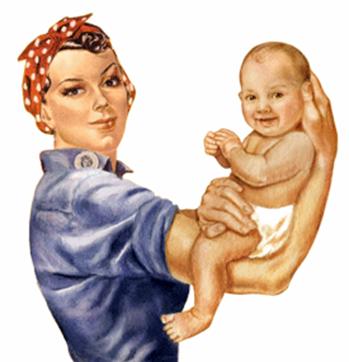In The Guardian, Keli Goff has some harsh words for women in my demographic who become stay at home mothers. In “Female Ivy League graduates have a duty to stay in the workforce” she writes:
But in the long run, degrees from competitive institutions should serve as more than modern day charm school or debutante diplomas. Sadly, it appears some women and men see them as such, simply a piece of paper to affirm that a woman is good spouse material for yet another man to use his Harvard Law degree to make partner at a law firm, while his wife stays home, never using hers.
Perhaps instead of bickering over whether or not colleges and universities should ask us to check boxes declaring our racial identity, the next frontier of the admissions should revolve around asking people to declare what they actually plan to do with their degrees. There’s nothing wrong with someone saying that her dream is to become a full-time mother by 30. That is an admirable goal. What is not admirable is for her to take a slot at Yale Law School that could have gone to a young woman whose dream is to be in the Senate by age 40 and in the White House by age 50.
Let me skip past any question about how far below the Ivies you can go before it’s ok by Goff to fritter away your diploma on your family, and go to the more important question: what is education for? I think Goff and I would agree that you learn to understand the world better and be able to act in it, but the conventional workplace isn’t the only place you can find a vocation.
Goff assumes that women who leave the workforce will cease to use the education that they paid for, but there’s nowhere you can go that learning about beauty and citizenship and character and tradition aren’t relevant. The liberal arts are supposed to have taken up philosophy’s mantle as preparation for death — the study of how we should live.
In my senior year at college, I spent about half my coursework on preparation for a Masters of Public Health (which I skipped out on when I got a job offer), and it’s true that I don’t frequently need to refer to the very technical knowledge I learned about which proteins are on the surface of what kind of T-cell. But every time I’m sick, I can remember my understanding of the immune system and the awe that swept over me at it’s beauty and complexity. The proteins I kept having to look up; the wonder stayed with me without effort.
The real skill you’re picking up from education is problem solving. You work in a lot of domains (some that you’re highly fluent in, some less so) and learn what strategies their practitioners have developed and add them to your arsenal or adapt them to your liking. And, as you learn so many different ways of thinking, you develop a kind of intellectual curiosity and compassion for other minds.
Even if a conceptual framework is poorly suited for the purpose at hand, you can be interested in how and why someone devised it. The lapses of the past make you wonder about your own blind spots, and the ideas you would have discarded but came to understand and love when you were stuck with them over a semester make you a bit less likely to kick over Chesterton’s fence.
The college grad starting out as a junior staffer or an administrative assistant may not be making much use of the more highfalutin’ skills she picked up, but those ideas and habits aren’t in abeyance until she gets promoted. They shape her choices outside of work and help her decide what organizations and causes she wants to serve, whether in a highly skilled way or not. Someone’s occupation shouldn’t be the only domain they expect to think critically in, and our place of employment isn’t the only space for us to give back.
Modern stay at home mothers might struggle to find ways to connect to their communities, but this isn’t because they’ve withdrawn from the workforce, it’s because the workforce is the only broad bond most people experience. The woman in the workforce and the stay at home mom could both use more Nisbettian communities and opportunities to learn and live well with others.

















